The End of Winter
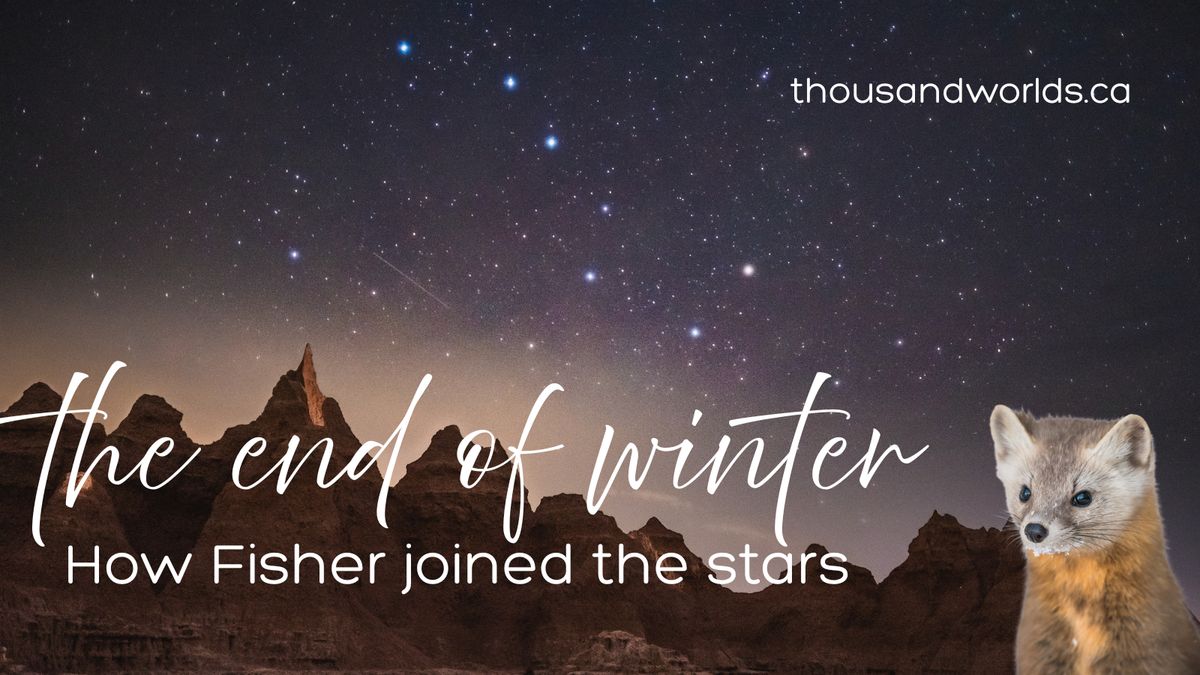
When we, humans, were created we were encouraged to follow the animals because they had been here longer than we were and they knew what they were doing. I was told that our Anishinaabe clan system descends from this belief, the various animals taking pity on us and becoming human so that they could teach us how to live well. This is a story about how we strayed from that path. It's a story about how we started to believe our own press and, as Isaac Murdoch says, lived like a two-legged instead of a four legged, wanting to make our own trails and thinking that we knew best. It is a story about restoring the foundations for good governance, which is basically just good relations within the community and with those outside of it. Good governance can look a lot of different ways, but it doesn't leave people behind and it finds a way to resolve conflict without great harm.
I often hear Anishinaabe people using the phrase "take pity on us." The animals took pity on us, Gizhe Manidoo takes pity on us. In our contemporary setting this can be heard as internalized oppression, but that isn't what it is. It recognizes our position within a much larger system, that we aren't the bright shining centre of it all. There are also times that we take pity on others and act towards justice because we're the ones with the capacity to do so in that moment. It's when we forget this reciprocity that things go sideways.
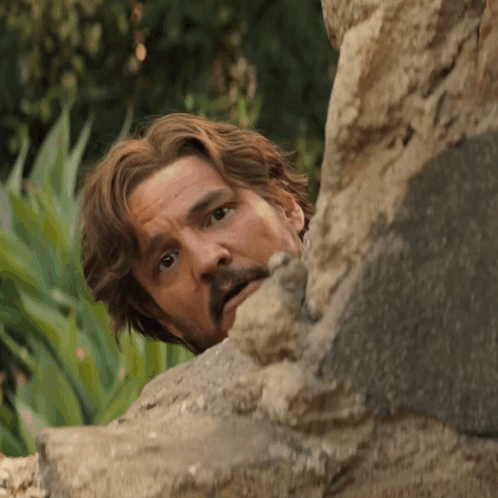
Whenever humans decide to just disregard the lessons that the worlds around us are teaching about how to live well with others, things go sideways and this story is no exception. Just wasting everything. Stepping on flowers because they can. Snapping branches because it makes a cool sound. Throwing out their leftovers and not even using the compost pile. And the fighting? Geez. So the animals withdrew because why wouldn't they? Would you stay in a house this messy with random fighting at all hours if you didn't have to?
Just because you can't see the spirits, and just because they are slow to react doesn't mean that they aren't paying attention and Biboon'nini was paying attention. He is the Old Man who lives in Skyworld, but way up in the North part and he had enough with our nonsense so he used the power he had and blew on us with his breath. Polar vortex. Everything got very cold very fast.
He hadn't quite reckoned with birds though and their song pushed his cold breath back. Think about that when they're going on at 4am outside your window. Think about the power of that birdsong to push winter back. Biboon'nini was vexed because who did those birds think they were? So he went down to earth, caught all the birds and brought them back to his wigwam in the sky. That's when things got really real.
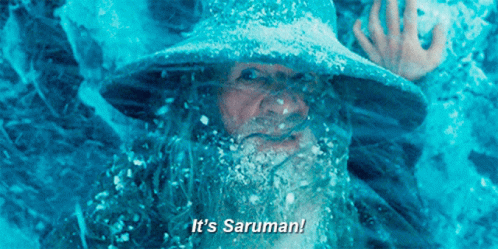
The Anishinaabek got worse, as people often do when scarcity sets in. What little you have takes on outsized importance and while they weren't being wasteful anymore, they weren't sharing either. Instead of focusing on what they did have they focused on what they didn't, and instead of working together they blamed each other and the fights got worse. The animals didn't know what to do and were losing hope. Withdrawing is an ok strategy if you're just trying to mind your own business, but when your business is getting frozen solid it's time for another strategy. They didn't have another strategy tho, everybody just sitting around saying "guess this is how the world ends."
Not Fisher though. Fisher didn't lose hope. He's like no, we have to figure this out. He threw down, which in our world means he put his tobacco down because he's about to propose something. It's a kind of transaction, a witness to a promise that somebody is going to have to keep. Running back and forth in front of the Animals he said, my son told me that there is a way. He continued, there might be a time when the courage of the Animals fails, when we forsake our friends and break all bonds of fellowship, but it is not this day! A day of wolves and frozen shields when all things come crashing down, but it is not this day! This day we fight.
So motivated, the other animals said ok den. Stoodis. And they laid their own tobacco down to witness their commitment. They agreed that they could climb Mount Doom, and once they got to the top they were going to jump from star to star and find the Old Man's wigwam, free the birds, and talk to him about what he's doing, make everything right again. So that's what they did. The fellowship of the birds was formed with Porcupine, Otter, Lynx, and the Great Fisher. These may not have been your first choices if you were casting this epic, but this is who stepped up so this is who went.
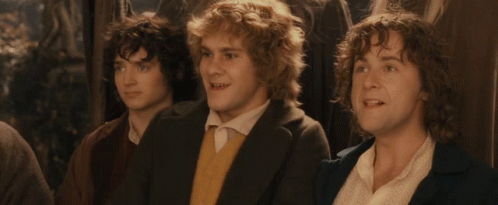
As all journeys are, this one was long and perilous. Peter Jackson could probably have made an epic movie about it that we could watch every Christmas. Eventually they made it to the mountain.
First try was throwing Porcupine as hard as they could and boy did he spiral up into the sky. He hit something they couldn't see, bounced right off it and went rolling down the mountain. Have you ever seen a porcupine walk? That funny kind of waddle they have? That's because when Porcupine landed he broke his feet and they never healed right. When we see that, when we wear jewelery with his quills or decorate a box with them, it reminds us what our foolishness cost. Our foolishness always costs others doesn't it.
Second try was Otter who took a big jump but bam, he hit whatever that was too and when he landed he went sliding down the mountain which tbh sounds more fun than landing and breaking all your feet. But seeing otters slide, even if it is adorable, that's also a reminder of our foolishness.
Lynx tried, bounced, and came crashing down to earth. A large rock broke his tail right off and you guessed it, another reminder of our foolishness. The short tails on Lynx reminds us that he wanted so bad for this to work, for all life - even our foolish selves, that he threw himself into the air with so much ferocity that it cost him his tail.
Ok, now we're down to Fisher and we've seen movies before so we know that Fisher is going to do it. He's feeling down because of what his friends went through but he remembers his son, and he remembers something his grandparents taught him. Digging around in the snow he found some bear berries (which are nothing like smart berries, that's a different story) and as he laid his tobacco down with the offerings of the berries he looked back up and noticed something. That barrier, it had cracks in it. The other animals hadn't failed at all, it just wasn't over yet. So emboldened he jumped and jumped and broke through.
He had more obstacles to overcome, but he did it and he got those birds out of the wigwam where they were trapped. The Old Man came chasing with arrows. Fisher he wouldn't be getting the heart to heart he was hoping for so he just made tracks for the hole with his bag of birds. The hole he came through wasn't very big, so he shoved them all through ahead of him and that's when he got shot by one of the Old Man's arrows. But he didn't even care because through the hole he heard those birds singing, their songs pushing back the winter.
The Old Man was mad because now he has to go back to earth and get those birds again, but turns out that his breath isn't the only one with spiritual power. As Fisher was dying, his last breath carried a request that went, as Murdoch says, exactly where it needed to go. Six Spirits heard him. They had seen everything. The thing with spirits is they don't always act fast like we do. Their response can seem really slow, especially when we're feeling like we're in a crisis and need some help right now. But when you live for a gazillion years and measure time in human generations instead of human minutes, waiting a hundred years for people to get their crap together doesn't seem very long even if it does to us. They saw what Fisher and his friends went through and they pitied the four leggeds even if they didn't care a fig for the two leggeds who were messing everything up. So they went to talk to the Old Man.
They told him, we get it. The two-leggeds are ruining everything and you want them to stop, you're trying to clean the earth. But you're freezing the Animals too and what did they ever do to you? You kidnapped the birds for crying out loud. The birds. Seriously. There's bad, but there's good medicine too and you can't destroy everything.
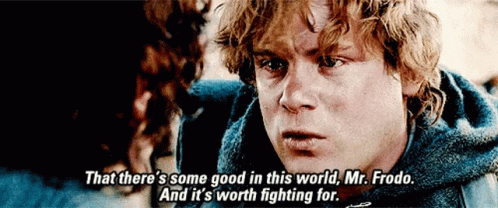
So the Six Spirits made a deal with the Old Man. He would get six months to blow his breath and calm us all down and the birds would get six months to sing their sacred songs.
And what about the Fisher? Well he became stars, what you might call the Big Dipper, to honour him and his sacrifice so that we could have spring and birds and all the good medicine there is. And he moves with the seasons, circling around the hole in the sky that he and his friends made so that life here could be good again. There's more about Fisher, but we're going to come back to that next week when we return to Jones and his story about Nanaboozho and the Fisher.
Another version from the Minnnesota schoolboard is similar, it's an end of winter story, but also different. There isn't anything there about Anishinaabek behaving badly, it's just always winter and never Christmas like happens in stories. And Fisher goes off with his friends, but instead of Porcupine, this story has Wolverine who leaps into the sky over and over until he breaks through which I mean, I've seen XMen so that was probably a good choice. Together this fellowship of the spring (nothing in this story about birds) pile into skyworld and chew through the hole, widening it so that the warmth could come down and restore balance. The sky people chased Fisher after he yells Hey! OVER HERE to distract them from the hole so they don't just fix it, and eventually they kill him with an arrow. But, instead of falling to earth the spirits honour him and he becomes the constellation. The story explains that the hole was not big enough for all the warmth to come from skyworld, and it's still winter half the year, but it's enough.
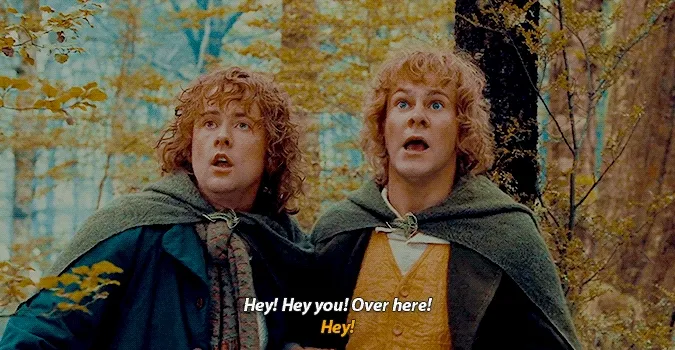
Murdoch's version gives us background on why it was always winter and never Christmas and then the reminders that exist all around us about the consequences of our greed and foolishness. Even beauty can carry the memory of sacrifice. I also appreciate the interplay between Biboon'nini, the Animals, and the Six Spirits. It takes the story away from a "just so" story about the seasons and puts it into the context of relationship, which is what good governance is.
I love Braiding Sweetgrass, I truly do, but I resent that so much of its popularity is owed to white people seeing us only as stewards of the land which is just the noble savage trope updated for our environmental age. That diminishes the book itself which doesn't actually make that argument, and it limits the authority of our knowledge to ecology. Keeps us off to the side while the grownups do grownup things. We do have that knowledge, and it is important, but our stories contain so much more than that. They contain information about how to live with each other, information that includes the natural world the west would disconnect us from, as beings with just as much agency as we have.
This is such a beautiful story about persistence, listening to our children, paying attention to the world around us, balance, and remembering that maybe human existence isn't the point of everything. The spirits in Murdoch's story were basically "yeah, we get it.,Old Man. For six months you can blow winter on the humans but then you have to stop." I'm going to think about that every winter now when I'm walking outside and I wonder why I live where the air hurts my face. Oh right, it's because we need the winter to calm us down. So yeah, lots of great stuff in here about resilience and organizing, about not losing hope, and taking our children seriously, but that's not what I want to focus on because it's awfully self evident, particularly in Murdoch's version. No. What I want to think about is how, in this story, winter is meant to interfere with our cycles of greed. It is not something just to be fought against, it exists with a purpose.
Because that's what the Old Man was trying to do. He was using the only power he had (his breath) to stop us before we did something really destructive that the planet wasn't going to be able to come back from. And then the spirits stopped him because in trying to stop us he was causing harm to everything and we aren't the bright shiny centre that everything revolves around. In the Anishinaabe creation story we are the last beings created which means that we are the least and most pitiful. We need so much in order to live, and that should make us humble but too often it does not.
Why do we forget that? Because we forget who we are. We get busy with everything that needs to be done and before long we're standing at the end of the day looking at all the things we did. Which is great! Because we did do things. But when we forget our stories we forget relationships. We start thinking that we did it by ourselves. Most of us do not live in small communities surrounded by people we can gather with and hear stories from. Most of us are busy trying to keep body and soul together and have little time for story anyway except what is served up for us on Netflix which we don't even watch because we're too busy doom scrolling to even pay attention to those stories. And most of us live in in cities, where the natural world is a little more controlled. Where it is ground up and recast into pavement and concrete with trees and plants chosen to meet our needs rather than as part of a larger ecosystem. We might be forgiven for thinking, in the world that has been made for us, that we are the centre of everything.
But that's the lie, and the story that we are told through all the ways that our lives are organized is something we don't even recognize as a story. We just think that's how things are. We live within a capitalist system that doesn't care about the rhythms of the natural world. Doesn't care that winter is a time for calming down and listening to stories, being reminded who we are.
That lie is the barrier that we need to break through. That we need to gather our friends against and be willing to be broken for. The lie is a single story that the way things are is how they have always been, but we have many stories that say otherwise. This system is not the best we can do and it does not just need a few tweaks here and there. Biboon'nini stopped us cold, literally. He did not offer some reforms, he demanded radical change and he was willing to grab all the birds in order to make that happen. We too need radical change, but we need to be rooted in our stories and be willing to listen to spirit so that our changes don't come at the expense of those who are not responsible for injustice. There is power in reclaiming winter as teacher rather than a foe, in taking stories seriously, and remembering that resistance may hurt but it is not in vain.
Let's put down our tobacco, and keep some promises.
Stoodis.
Hope is a Woman's Name: My Journey as a Bedouin Palestinian Activist in Israel by Amal Elsana Alh'jooj. I heard Alh'jooj speak at a panel about her work in Palestine among her community. Her book is full of wisdom: the steps she took to organize and work with her community as well as the ways that she worked within a patriarchal system she chafed under in order to achieve great things. Her story is a good reminder to begin where you are with who is in front of you, even if it's hard.
Medicine Stories: Essays for Radicals by Aurora Levins Morales is another book reflecting on a lifetime of activism, in this case the work of a Jewish-Puerto Rican woman. What are the structures that divide us? That silence us? And how can we respond to those things in a way that removes those barriers without creating more problems for marginalized peoples.
Let This Radicalize You: Organizing and the Revolution of Reciprocal Care by Kelly Hayes and Mariame Kaba is a collection of essays by experienced organizers to encourage people who are new to organizing with things they wished they knew. Much of the work that Hayes and Kaba talk about is like what Alh'jooj and Levins Morales discuss: taking care of each other. There is a lot of writing out there about community, rather than self, care. Adrienne maree brown's Emergent Strategy series is also pretty great.
As Many Ships As Stars by Weyodi Oldbear. I loved this book about space-faring Comanches. I'm including it here because in this story they don't just leave their land, they leave the planet and yet they wind up returning to themselves. Being away from the land of their ancestors, they root themselves in their stories. In the midst of everything, they carry their stories and they remember who they are.
The premise of Bad Indians Book Club is not that Ojibwe stories are the best stories, but that we all have stories about how to live in this world and that those stories matter. Fiction and nonfiction, all we are is story.
If you are as excited about Bad Indians Book Club being released as I am and would like to be part of the release crew you can sign up here.
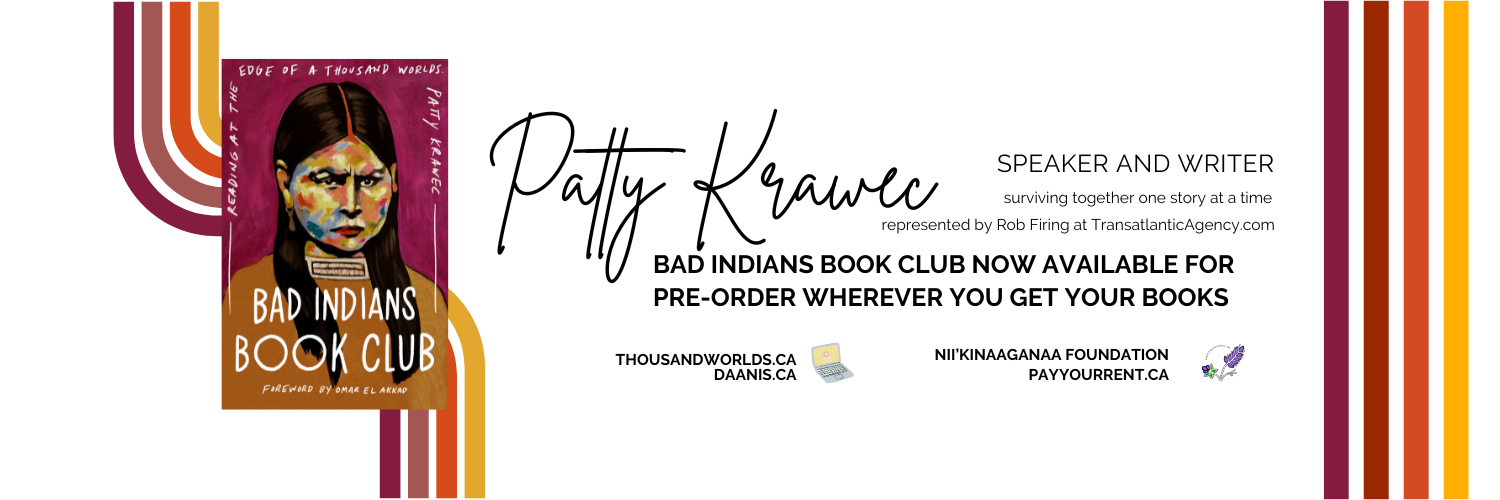

And don't forget to join up with the Nii'kinaaganaa Foundation. Every month we collect funds from people living on Indigenous land and redistribute them to Indigenous people and organzers. You can find out more information on the website which is now powered by ghost, which means that you can become a subscriber there just like you are here! This month is particularly hard, we've got $7300 in requests, and $1500 to meet them with so if you can hit us with a single donation please do!
